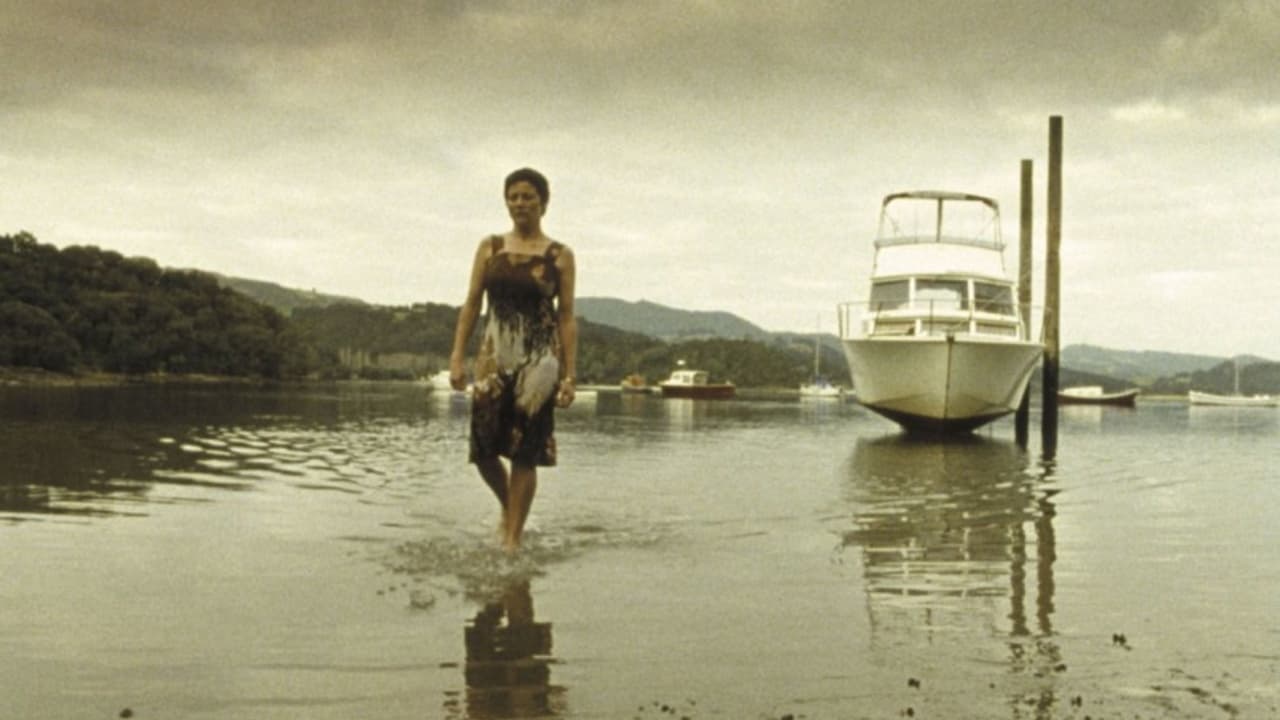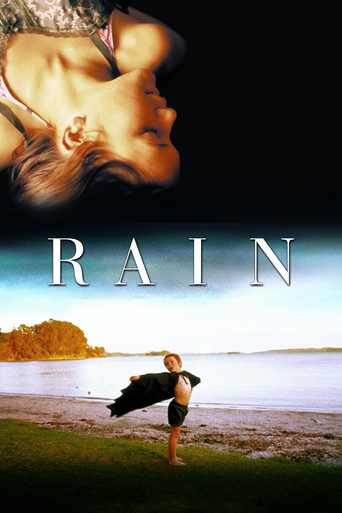Glucedee
It's hard to see any effort in the film. There's no comedy to speak of, no real drama and, worst of all.
Neive Bellamy
Excellent and certainly provocative... If nothing else, the film is a real conversation starter.
TheUnknown837-1
I am a real sucker when it comes to movies that deal with subjects such as coming-of-age, first loves, families dividing, and independence in the younger generation. So it was no surprise to me that I found myself wrapped in the story of "Rain," a 2001 import from New Zealand about a 13-year-old girl watching her family slowly separate with the coming of a photographer, who takes a shine to her emotion-drained mother. As her mother and the photographer begin an extramarital affair, young Janey also struggles to teach her younger brother in the ways of the world, and combat the fact that she has an attraction toward this man herself."Rain" is played with a straight face, but this is to its advantage. It is a nice little film about many subjects; some of which we can relate to, others we hope never to. The plot does not thicken or compound itself with complications and big, astronomical twists. For most of its running time, it's sort of mundane. It almost seems like a Yasujiro Ozu film with a constantly moving camera. It presents life as it is without becoming melodramatic or hyperbolic and I think this is the reason why a lot of us can understand the position of Janey, who is very well-played by Alicia Fulford-Wierzbicki, and get involved in a story that is edited with gentle pacing.Some of the directing is a little hampered (no surprise, since it was Christine Jeffs's debut) but is overcome by deliberately rich symbolism. There are symbols and graphic representations found all throughout this movie and a sharp-eyed person will be very appreciative toward them. Example: daughter wants to confront her mother about a touchy issue with a little hostility. Her brother is off to the side, blowing bubbles through his straw into his drink to simulate boiling water: a parallel to the brewing animosity between the two characters.The movie is also rich with its details about the coming-of-age part of a person's life and this is what, I think, really drew me in. Janey is on-screen almost all of the time and we see her go through the rough parts of growing up. She experiences her first kiss, her first crush on an adult, her strives for independence from her parents brews, her desire to both instruct her younger brother and to get away from him, to stand on her own two feet, etc. We've all been there before. We don't get that many (compelling) coming-of-age stories these days and so a movie like "Rain" is worthy of appreciation.Performances are very good. Alicia Fulford-Wierzbicki, most of the time, stays solid in her characters and expresses her emotions (many of them withheld) wonderfully. She's a very good actress. As her emotionally-drained, seemingly lifeless mother, Sarah Peirce is very good, representing her inner feelings remarkably well while keeping a straight, seemingly exanimate face. The same can be said of Alistair Browning as the father. There's great energy in the performance by Aaron Murphy as the young, highly adventurous and free-spirited brother and a solid performance from Marton Csokas, whom "Lord of the Rings" fans are sure to recognize. There's also a very good supporting performance from David Taylor as the boy down the beach with a crush on Janey. His part, though very small, also contributes to this very sweet little painting of a movie.Warning: parents considering showing this movie to children might want to take into mind a brief, erotic prelude scene to lovemaking, and some brief flashes of male genitalia during a beach scene.
kpkp_de
New Zealand 1972: 13-year-old Janey (Alicia Fulford-Wierzbicki) spends the summer with her family near a "paradise likely" beautiful beach. Janey "wakes up" to a Lolita with immense sexually interest. Her mother Kate, like a Greek goddess, is afraid of losing her beauty. Already somewhat weathered, are her children an affectionate father, but whenever he strives for his wife, she rejects it. Thus he drowns his grief in Bourbon- and beach parties.((A small comment to a small mistake in a detail:Camera closeup to one of his whiskey bottles shows a so called EAN Code, a code of stripes which is in worldwide use today, i.e. for scanning articles in super markets.However, this product code was first time in use in the U.S. 1973 (!), so this whiskey bottle in the film (plays in NZ, 1972) must have come there from the future. (-;This excursus only, to show, that a good camera mans work is obviously watched in every detail by some spectators.))Back to the story: A photographer living on a boat makes friend with the family, and later on, secretly he takes photos of Janey, while her brother is drowned in the sea.Overwhelming pictures of camera man John Toon lets "Rain - lightning at the Kiwi beach (Title in Germany)" "float" like a dream.Nearly without words, with a view to the speaking things of the everyday life, Christine Jeffs in their celebrated feature debut creates exciting close tendencies between suspense and tragic necessity - the summer counterpart to Ang Lees film "Ice Storm". To the bitter end "Phantom Love", music by Lisa Germano. Her painfully beautiful voice seems to die at broken heart, but it holds out. "Rain" tells and shows eerily beautifully about "the art of standing though". Hold on!I'm sure, we will see Alicia Fulford-Wierzbicki again! I'm looking forward to her next, even better film.
Claudio Carvalho
In New Zealand, the teenager Janey (Alicia Fulford-Wierzbicki), her young brother Jim (Aaron Murphy), her mother Kate (Sarah Peirse) and her father Ed (Alistair Browning) are spending their summer vacation in a seaside cottage. Janey takes care of Jim most of the time, teaches him how to have endurance under the water, and observes the behavior of her parents, whose marriage is near the end. Kate and Ed promote many parties in the house and mainly Kate drinks a lot. She is also having an affair with the photographer and owner of a boat, Cady (Marton Csokas). The confused adolescent, rebel with her mother and dealing with a growing sexuality, tries to act like an adult with tragic consequences to the family."Rain" is a great surprise, being a profound, powerful, nostalgic and sensitive coming to age and family drama. The impressive and very mature debut of the young actress Alicia Fulford-Wierzbicki in the key role of Janey would certainly deserve a nomination to the Oscar if "Rain" were a Hollywood movie. The story is very simple and dramatic, but never corny, all the characters are very well developed though their personal dramas and the very convincing performance of the unknown cast is amazing and touching. This is the first work of director Christine Jeffs that I see, and I am very impressed with her sensibility and taste. The music score is wonderful, and the cinematography is indeed very beautiful. I would like to record my congratulations to the people involved in this little gem. My vote is eight.Title (Brazil): "Chuva de Verão" ("Summer Rain")
eewittme
The acting (particularly by Alicia Fulford-Wierzbicki) and cinematography of this movie are so well put-together that it makes the movie's horrible cliche of an ending that much more painful and embarrassing.(Here come the spoilers)Jim's death at the end of the movie is a cheap gimmick that director Christine Jeffs telegraphs from square one. It's a lame, moralizing made-for-TV-movie plot device that attempts to somehow punish the film's characters for their perceived moral transgressions (Janey and Jim's parents' drinking and Janey's experimentation with sex). By killing off Jim immediately after (or during, it's not clear) his sister's first experimentation with sex, the cast and crew of "Rain" come across as a bunch of holier-than-thou moralists. "This is what happens when innocent young children are left unsupervised so the adults can go off and drink and have sex," we can almost hear Jeffs saying while she wags her finger at her audience.It's not clear if Jim's death is something taken from Kirsty Gunn's novel or if it's introduced in Jeffs' adaptation. Whatever the case, Jeffs ought to have had the sense not to kill off Jim right after Janey's encounter with Cady. The final quarter or so of the movie should be about Janey coming to grips with her encounter with Cady. Instead, Jeffs rips the focus away from an uncomfortable subject by drowning Jim, after which she tries to tidy up the movie with a quick funeral and another cliche, the "driving home in a car after a tragic event" scene. "And after that summer, I was never the same," we can almost hear Fulford-Wierzbicki saying during the film's final voiceover.It's almost as if Jeffs is afraid to let Fulford-Wierzbicki act out her character's reaction to her sexual awakening, or to show her parents acting out their split on screen. It's an awful way to end a movie, and I can't recommend this movie to anyone but moralizing, condescending types who like nothing more than to see characters suffer for sins that are actually little more than character flaws.

